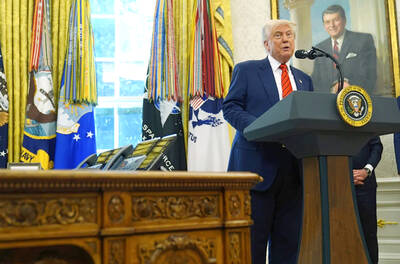Negotiators for the government of Colombian President Juan Manuel Santos and the leftist Revolutionary Armed Forces of Colombia (FARC) were to meet in Havana, Cuba, yesterday for talks aimed at ending Latin America’s longest-running insurgency.
Chief Colombian government negotiator Humberto de la Calle said he believed this is “the defining moment” to reach a peace deal with the FARC guerrillas, as both sides have agreed that talks “must end with a final agreement on the conflict.”
The Santos administration wants to build “a stable peace,” De la Calle told reporters as he boarded a plane for Havana on Sunday, and envisaged that “the FARC would be turned into a legal political party.”
Colombian officials and the FARC symbolically opened peace talks in Norway last month, raising hopes that the decades-long conflict that has killed hundreds of thousands Colombians may finally come to an end.
Support for the FARC would best be gauged in an election, said Tanja Nijmeijer, a Dutch woman who has fought with the guerrillas for a decade and is the group’s spokesperson at the talks.
“Only if FARC laid down its weapons and maybe in 2014 participate in the elections will it be known how big our support really is,” Nijmeijer told a Dutch newspaper last week.
There are signs that Latin America’s largest rebel group, founded in 1964 and believed to have about 9,200 armed fighters, may be ready for a truce after a long string of setbacks.
In recent years, several top FARC members have been captured or killed, the group has suffered military defeats and its ranks have dropped to half the number of fighters compared to their peak in the 1990s.
Yet some remain skeptical of the peace effort — the first of its kind since 1992 — since no ceasefire has been declared.
The Colombian government has said it will give the talks “a few months” to succeed, while the FARC has warned against an “express peace.”
The latest talks were scheduled to start on Thursday last week, but were delayed to clarify the role of civilian representatives.
The talks, the fourth attempt at peace between Bogota and the FARC, will focus on a five-point agenda that includes the thorny issue of rural development.
The FARC took up arms almost 50 years ago to protest the concentration of land ownership in Colombia. Little has changed over the years, as more than half of the country’s largest properties are controlled by 1 percent of the population, a UN report released last year showed.
“The war in Colombia has mainly been a rural war that has affected a great number of farmers,” said Alejandro Reyes, sociologist and analyst for the Web site Razon Publica. “The rural issue is a golden bridge that allows the guerrillas to get out of the conflict and enter mainstream politics.”
However, both sides must also agree on a mechanism to end hostilities, incorporate the rebels in political life, curb drug trafficking and compensate victims of abuses committed by guerrillas and Colombian government troops.
According to the UN, hundreds of thousands of people have died and 4 million driven from their homes in a conflict that also involves a smaller guerrilla army and right-wing paramilitary groups.

A new online voting system aimed at boosting turnout among the Philippines’ millions of overseas workers ahead of Monday’s mid-term elections has been marked by confusion and fears of disenfranchisement. Thousands of overseas Filipino workers have already cast their ballots in the race dominated by a bitter feud between President Ferdinand Marcos Jr and his impeached vice president, Sara Duterte. While official turnout figures are not yet publicly available, data from the Philippine Commission on Elections (COMELEC) showed that at least 134,000 of the 1.22 million registered overseas voters have signed up for the new online system, which opened on April 13. However,

ALLIES: Calling Putin his ‘old friend,’ Xi said Beijing stood alongside Russia ‘in the face of the international counter-current of unilateralism and hegemonic bullying’ Chinese President Xi Jinping (習近平) yesterday was in Moscow for a state visit ahead of the Kremlin’s grand Victory Day celebrations, as Ukraine accused Russia’s army of launching air strikes just hours into a supposed truce. More than 20 foreign leaders were in Russia to attend a vast military parade today marking 80 years since the defeat of Nazi Germany in World War II, taking place three years into Russia’s offensive in Ukraine. Putin ordered troops into Ukraine in February 2022 and has marshaled the memory of Soviet victory against Nazi Germany to justify his campaign and rally society behind the offensive,

CONFLICTING REPORTS: Beijing said it was ‘not familiar with the matter’ when asked if Chinese jets were used in the conflict, after Pakistan’s foreign minister said they were The Pakistan Army yesterday said it shot down 25 Indian drones, a day after the worst violence between the nuclear-armed rivals in two decades. Pakistani Prime Minister Shehbaz Sharif vowed to retaliate after India launched deadly missile strikes on Wednesday morning, escalating days of gunfire along their border. At least 45 deaths were reported from both sides following Wednesday’s violence, including children. Pakistan’s military said in a statement yesterday that it had “so far shot down 25 Israeli-made Harop drones” at multiple location across the country. “Last night, India showed another act of aggression by sending drones to multiple locations,” Pakistan military spokesman Ahmed

US President Donald Trump on Wednesday said that he would make a decision about how the US government would refer to the body of water commonly known as the Persian Gulf when he visits Arab states next week. Trump told reporters at the White House that he expects his hosts in Saudi Arabia, Qatar and the United Arab Emirates will ask him about the US officially calling the waterway the Arabian Gulf or Gulf of Arabia. “They’re going to ask me about that when I get there, and I’ll have to make a decision,” Trump said. “I don’t want to hurt anybody’s